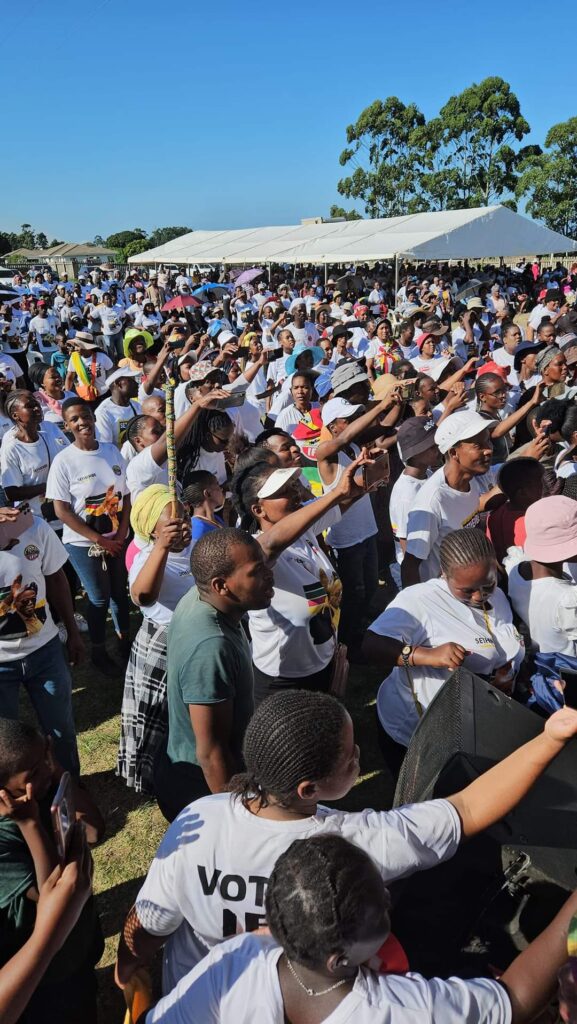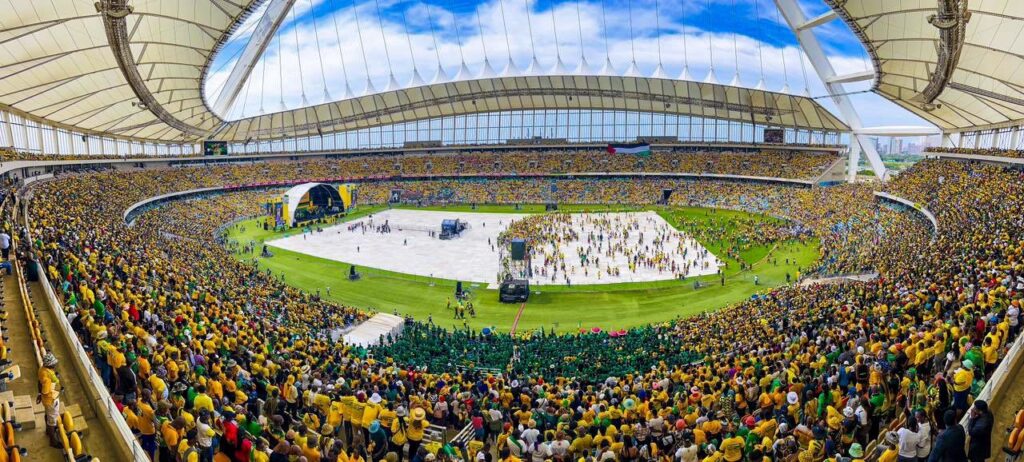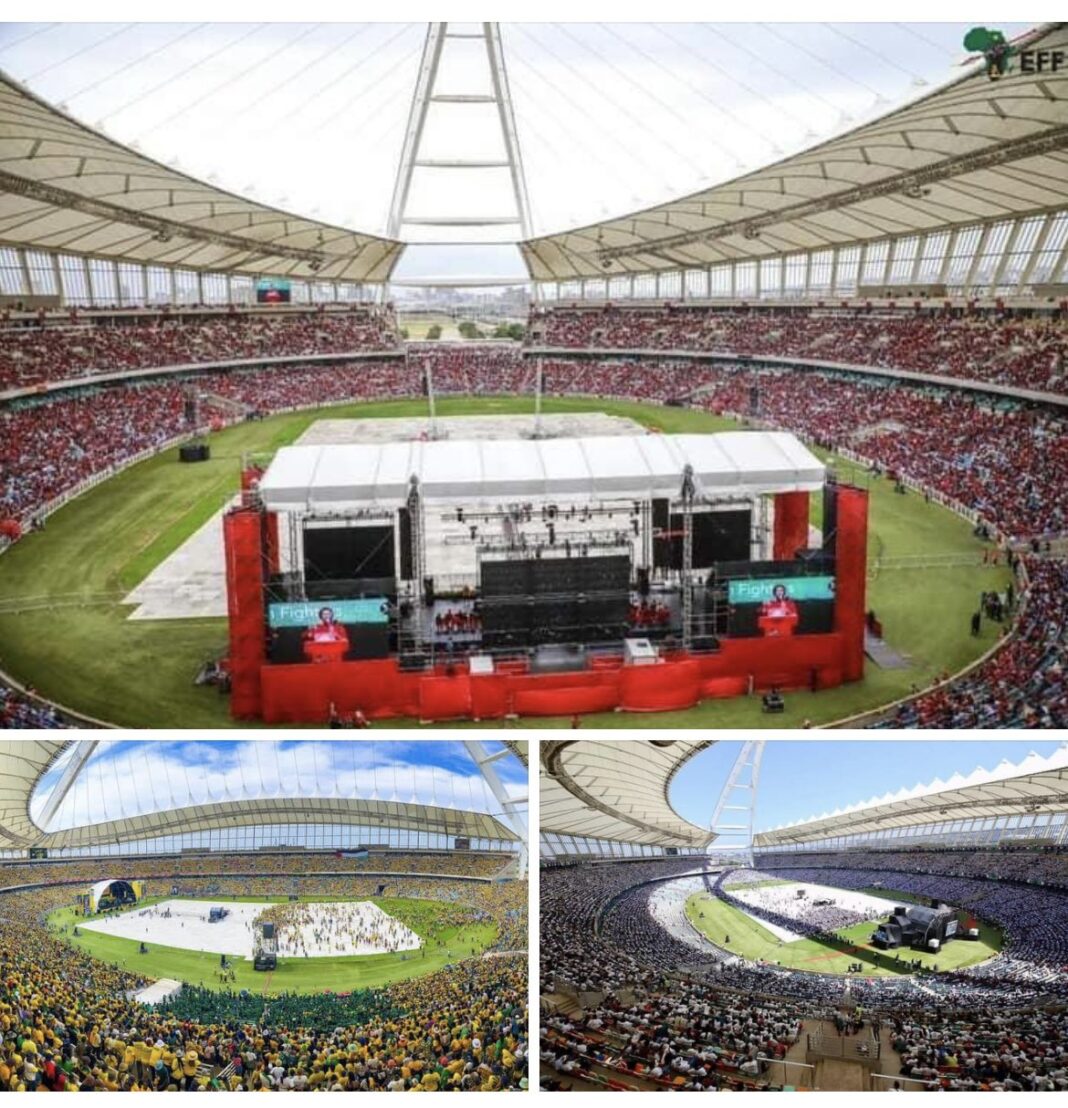Inside Politics Analysis
Last weekend the Inkatha Freedom Party (IFP) launched its election manifesto at a packed Moses Mabhida Stadium in Durban, a major show of organisational muscle ahead of the 29 May National and Provincial Elections.
It followed in the footsteps of the Economic Freedom Fighters (EFF) and African National Congress (ANC) in doing so – an indication of both the significance of KwaZulu-Natal in national politics, and its vulnerability for the ANC.
The top leadership of the three parties has continued to campaign on the ground since, with president Cyril Ramaphosa returning to the province for door-to-door work on the upper KwaZulu-Natal South Coast on Sunday.

Ramaphosa and other members of the ANCs Top Seven have been in the province weekly, maintaining a high profile presence to try and combat both the resurgence by the IFP and the breakaway uMkhonto WeSizwe party from within its own ranks.
The significance of KwaZulu-Natal in national politics cannot be overstated.
According to figures released by the Electoral Commission of South Africa (IEC) last week, near 5.74 million of South Africa’s 27.79 million registered voters live in KwaZulu-Natal, which, with Gauteng, makes up 44.3% of the country’s registered voting population.
Whoever takes control of the two provinces is in de-facto control of the country, a fact that is not just on the radar of the three parties which launched their manifestos there.
The IFP hopes to take back control of the Province it lost to the ANC in 2004 by consolidating the ground it regained in the 2019 and 2021 elections – and by capitalising on the breakaway by the Umkhonto weSizwe Party under former president Jacob Ziuma.
The IFP believes its pre-election coalition with the Democratic Alliance and other parties will allow it to win back control of the province, where a working relationship with the DA at Local Government level in which only one of the two parties fields a candidate has seen them take 13 wards off the ANC since 2023.
The IFP is banking on its votes from KwaZulu-Natal bolstering its national vote and ensuring that it secures a presence in a post election coalition government at a cabinet level as a result.
Between 2004 and 2014, KwaZulu-Natal, South Africa’s second most populous economically influential province, was the ANC’s strongest province – an electoral fortress for the governing party.
But going into the 29 May National General Elections, the Province is now, along with Gauteng, an area of weakness which the party may either lose control of completely – or be forced into a coalition to stay in power post the poll.

The ANC’s loss of support in the province, combined with the resurgence of the IFP, and the emergence of MKP mean KwaZulu-Natal is effectively up for grabs on 29 May.
The ANC first took control of the province from the IFP in 2004, when it secured just over 47% of the vote, and went on to consolidate its hold over KwaZulu-Natal in the two subsequent elections.
In the 2009 national and provincial elections the ANC took 63.97% of the vote in KwaZulu-Natal, and improved on this performance in 2014, when its share of the vote reached 65.31%.
In both polls the province also contributed significantly to the ANC’s national victory, with votes from KwaZulu-Natal helping it secure its majorities in the National Assembly and the National Council of Provinces.
However, the internal tensions in the party sparked by the recall of Zuma in February 2018 had a serious impact on its ability to contest elections in KwaZulu-Natal and saw the ANC fare far worse in the province in the 2019 national and provincial elections.
The ANC’s KwaZulu-Natal tally was cut to 55.47%, a downward trend which was to continue at local government level in 2021, which took place after the riots – sparked by Zuma’s incarceration in June of that year – which claimed more than 300 lives.
Along with a number of significant rural municipalities like Newcastle and uMhlathuze, the ANC lost its majority in the eThekwini Metropolitan Council for the first time after November 2021.

The party had to turn to the EFF and smaller parties to retain control of the city, and has continued to do so to stave off several motions of no confidence brought against mayor Mxolisi Kaunda by the opposition in the city since.
Since then, the situation has worsened.
A recent poll released by the Brenthurst Foundation showed support for the ANC in the Province to have dropped to 20%, with the MKP taking 25% and the Democratic Alliance and its Multi-Party Charter for South Africa allies taking 39% of the votes.
Results from recent elections in KwaZulu-Natal do not paint an attractive picture for the ANC either.
Not only has it suffered major losses to the IFP in by-elections, but the MPK has also eaten heavily into its vote in those which it has contested since the beginning of the year.
In the ward 2, uPhongolo by election in Zululand last month, the MKP took 28% of the vote, taking numbers off both the ANC (which fell from 43% to 33%) and the IFP (which dropped from 48% to 23%.
The fledgling party also did well in by election in AbaQulusi’s ward 8, where the IFP took 505 votes, the ANC 336 and MKP took 211 out of a total of 1 085 votes.
The MKP has not contested any subsequent by-elections in the province, appearing now to be concentrating on the coming national and provincial poll.
The official opposition has also been eyeing KwaZulu-Natal closely.
It has fielded its Umngeni Municipality mayor, Chris Pappas, as its premier candidate, hoping to capitalise on his service delivery record at local government level going into the poll – and to cut the ANC’s numbers nationally in the process.
Speaking at the launch of the DA’s KwaZulu-Natal manifesto at the weekend, chief whip Siviwe Gwarube said that the fight for the province would influence the outcome of the national elections.
“This is not just about KwaZulu-Natal,” Gwarube said. “This is about rescuing South Africa.”
“We know this province brings the ANC the majority of its votes which brings up their numbers nationally. If we starve them of these numbers here; they will battle to put together 50% nationally,” Gwarube said.

